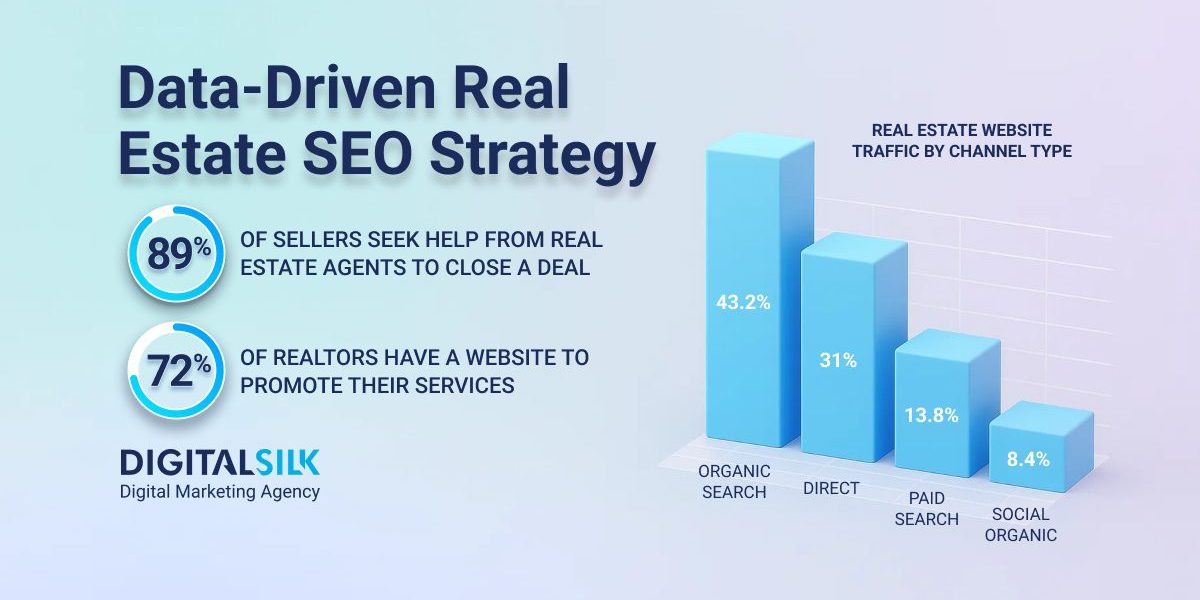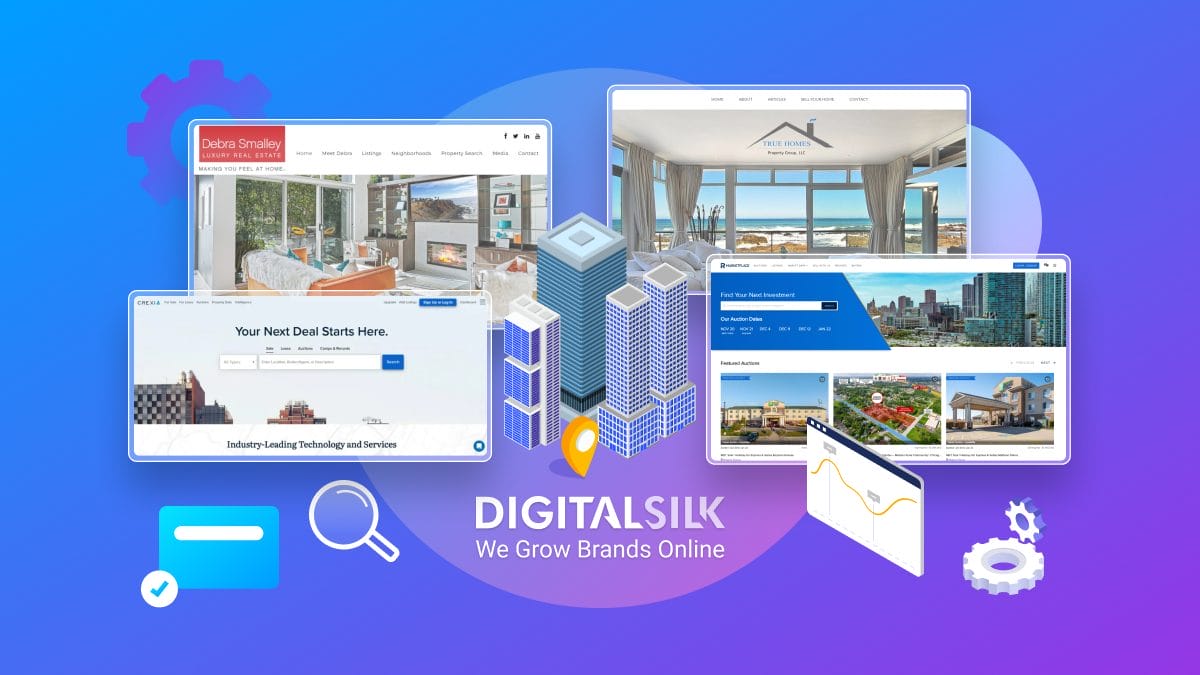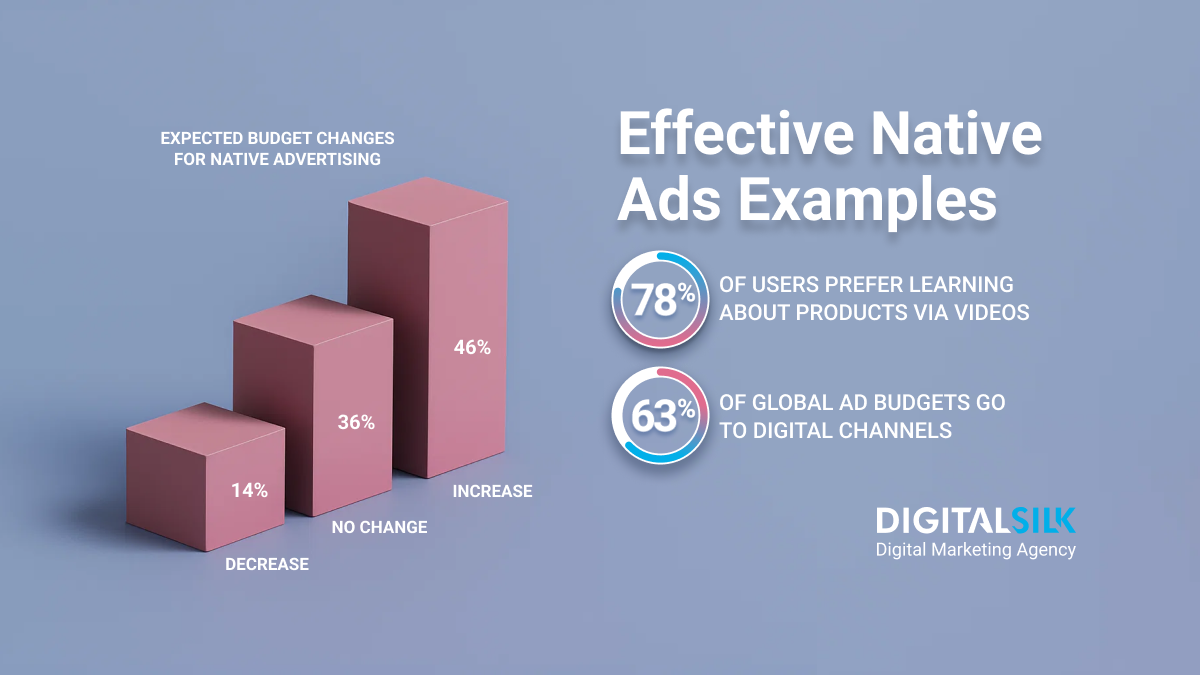Real Estate SEO: Key Highlights
-
Authority starts with visibility: SEO turns listings into recognizable assets that build credibility across every search.
-
The power of place: Local keywords and neighborhood focus connect each property to buyers with real intent.
-
Content that converts: Clear structure, engaging descriptions and quality visuals help listings stand out naturally.
Even premium property listings can go unnoticed without a solid SEO strategy.
As North America leads the global market with $1.3 trillion in listed real estate in 2024, SEO determines which properties earn attention, build trust and generate qualified inquiries.
Buyers now begin their journey with a search, where visibility shapes perception and influences every decision that follows.
This guide explores 10 data-driven real estate SEO strategies that help property owners, agents and investors boost visibility, attract qualified buyers and grow market authority.
10 Real Estate SEO Strategies That Work
As local real estate markets get more competitive and buyers become more selective, search rankings reflect more than visibility as they reveal credibility and influence in the market.
Targeted SEO strategies for real estate agents turn listings into trusted digital assets that attract informed buyers and long-term opportunities.
The following insights show how to turn search performance into measurable growth and sustained authority:
1. Conduct A Comprehensive SEO Audit
A comprehensive SEO audit is the foundation of every sustainable digital strategy.
Without it, even the best SEO strategies for real estate websites risk wasting resources on tactics that fail to address underlying issues.
With organic search driving 43.2% of all traffic to real estate websites, understanding where your site stands and what’s holding it back is the first step toward measurable growth.
An audit clarifies how well your website communicates value to both search engines and potential buyers, so you can prioritize strategies that directly influence qualified leads and sales.
Key elements of a real estate SEO audit include:
- Indexation & crawlability: Use Google Search Console and Screaming Frog to uncover unindexed listings, blocked resources, and redirect chains.
- Site speed & Core Web Vitals: Compress high-resolution property images, leverage caching, and optimize scripts to improve user experience.
- Duplicate listing detection: Real estate platforms often duplicate MLS or IDX content. Canonicalize URLs to preserve unique value and prevent crawl waste.
- Mobile performance: With most home searches beginning on mobile, responsive layouts and intuitive navigation are non-negotiable.
- Structured data validation: Check your schema markup for Offer, Place, Product and BreadcrumbList types to enhance SERP appearance.
- Competitor benchmarks: Compare organic visibility, backlinks and keyword share of voice to identify untapped opportunities.
Run a full audit using tools like Ahrefs, Sitebulb or SEMrush’s Site Audit. Prioritize fixes that directly impact crawlability, speed and conversion flow.
2. Improve Keyword Mapping & Local Intent
Improving keyword targeting is one of the most decisive steps in making SEO for real estate strategies work.
With 89% of sellers using real estate agents to help sell their properties in 2024, the opportunity is immense if you know where to look.
Competing for broad, high-volume phrases like “homes for sale” dominated by large directory sites rarely deliver meaningful results.
Instead, focusing on location-specific, intent-driven keywords such as “two-bedroom apartments in Lakeview Chicago” or “family homes near Austin schools” helps you reach buyers who are actively searching for properties in your area.
To uncover relevant keywords, start with a structured plan:
- Map out your service areas by listing every neighborhood, district and community where you manage or promote properties.
- Use keyword tools like Google Keyoword Planner, SEMRush’s Keyword Magic or Ahrefs’ Keyword Generator to explore search volume, difficulty and intent for each location.
- Segment by funnel stage: Target top-of-funnel users with keywords like “best neighborhoods in [city]”, mid-funnel conversions with “condos near [landmark]” or bottom-funnel customers with “buy 3-bedroom home in [area]”.
- Cluster by topic: Create a parent “area page” linking to multiple property type subpages (e.g., condos, lofts, townhomes).
- Track conversions: Use GA4 events for “Property inquiry” or “Schedule a viewing” to see which keywords bring serious buyers.
- Filter your results by setting the keyword difficulty range between 0 and 50 and selecting “Commercial” and “Transactional” intent to identify people ready to buy or sell.
- Review competition on search results to see where local agents appear alongside directory sites, revealing opportunities for your pages to compete.
Here’s how this could work in practice with SEMRush:
- Enter “Hell’s Kitchen” in the Keyword Magic tool.
- Review the list of related terms, such as “Hell’s Kitchen apartments for sale” or “Hell’s Kitchen condos near Hudson Yards.”
- Apply filters to narrow results to low-difficulty, high-intent searches.
- Evaluate the SERP for those terms to see if both local realtors and directories are ranking, indicating realistic potential for visibility.
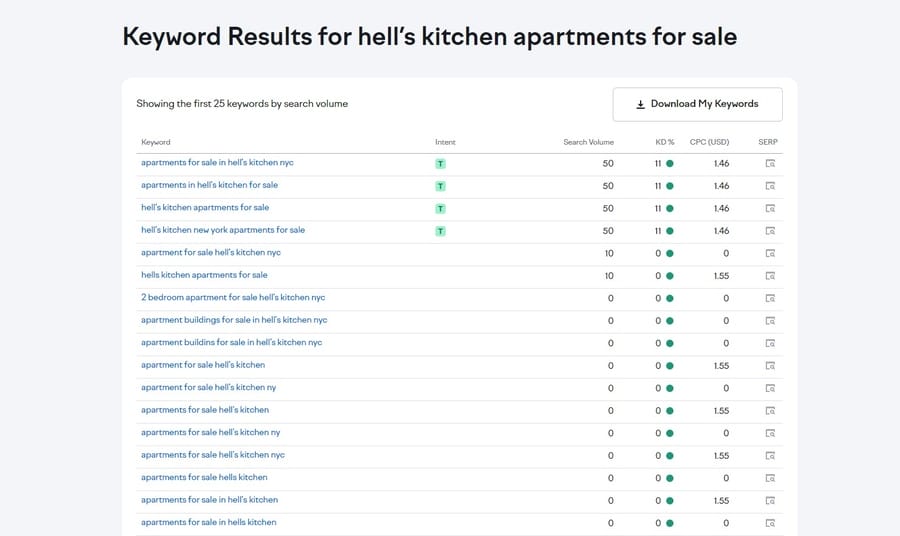
You can combine geographic and lifestyle modifiers (“pet-friendly condos in Brooklyn,” “luxury villas with ocean view Costa Rica”) to dominate local SERPs.
This approach helps you target searches that convert, aligning your content with real buyer intent and connecting your listings with people actively looking to make a move.
3. Optimize Your Google Business Profile & Citations
Local search is where decisions happen.
When someone searches “real estate agent near me,” Google’s Local Pack shows three results, typically the profiles with the most reviews, consistent Name, Address and Phone Number (NAP) data and active engagement.
Effective SEO strategies for local real estate markets start with visibility that converts curiosity into connection.
With 43% of buyers saying their first step was to look for properties online, optimizing your business profiles ensures your agency appears where those searches begin.
To improve your position in local search results:
- Complete and verify your Google Business Profile: Include your business name, category, location, contact details and verified service areas. Keep every field accurate and up to date.
- Maintain NAP consistency: Ensure your Name, Address and Phone Number match across all listings so search engines and clients can identify your business confidently.
- Add fresh visuals regularly: Include property photos, team images and active listings to show activity and reliability.
- Encourage client reviews: Ask for feedback and respond professionally to demonstrate transparency and engagement, which also signals quality to Google.
- Submit listings to reputable directories: Add your business to trusted platforms like Zillow, Realtor.com and Homes.com to increase visibility and authority.
- Use Google Posts to stay active: Share updates about new listings or recent sales to keep your profile relevant and appealing.
If you type “Los Angeles real estate agents” into Google, the top results display a Local Pack featuring businesses like TruLine Realty, Keyes Real Estate and the Stephanie Younger Group.
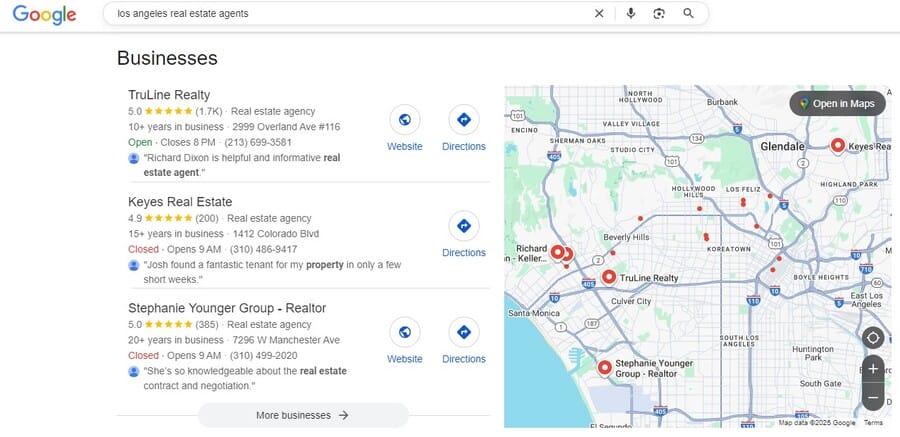
Each profile includes ratings, reviews, business details and direct links, showing how local optimization directly affects visibility and credibility.
This example highlights how data-driven SEO strategies for local real estate markets ensure your agency appears where buyers are actively searching.
4. Optimize Property Pages With On-Page SEO
Optimizing property pages is one of the most important steps in real estate SEO.
These pages connect search visibility with buyer intent, shaping how people discover and evaluate your listings, which in turn builds credibility and attracts qualified visitors.
The steps you can take at this stage include:
Optimize Metadata
Metadata acts as the first impression your property pages make in search results, as it tells both search engines and potential buyers what your page is about and why it’s worth visiting.
When these elements are compelling and well-written, they help search engines understand the context and improve rankings, while drawing users’ attention to your listings among competitive search results.
To write metadata that improves visibility and engagement, focus on the following:
- Create distinct title tags for every property page so search engines can easily differentiate between listings. Keep titles between 50 and 60 characters to prevent them from being cut off in search results.
- Write concise meta descriptions under 155 characters that summarize what visitors can expect to find on the page. A strong description should give a value and encourage users to click.
- Include location and property type naturally in both titles and descriptions so search engines associate your pages with relevant local searches.
- Avoid keyword stuffing and write in a way that sounds natural while still aligning with how buyers search.
- Review and refresh metadata regularly to reflect updated listings, new pricing, or changing market focus.
For instance, The Corcoran Group’s website title and description show how concise metadata can communicate value and drive clicks.
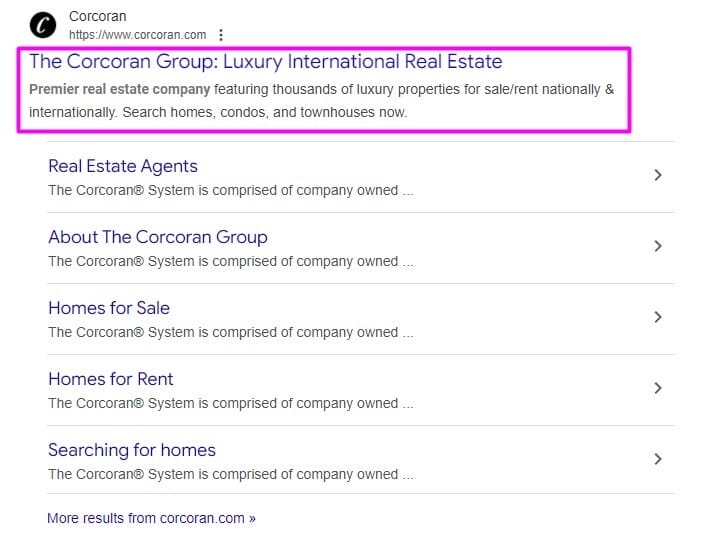
The copy uses clear, direct language that defines what the company offers and who it serves, focusing on luxury buyers and sellers across national and international markets.
This approach reflects effective SEO strategies for luxury real estate agents, where clear titles and precise descriptions help stand out against larger directories while reinforcing brand authority in search results.
Structure Headings Thoughtfully
Your site’s headings organize information in a way that highlights relevance, improves readability and helps buyers quickly find what matters most.
A clear, logical structure signals to search engines what each section represents and keeps users engaged as they move through the page.
To organize your headings effectively, follow these steps:
- Use a single H1 that defines the main purpose of the page.
- Organize supporting sections under H2 and H3 tags for better flow.
- Add neighborhood or property details naturally within subheadings when relevant.
- Avoid repeating keywords and keep headings conversational.
- Arrange headings in an order that mirrors how buyers would explore the page.
For instance, Douglas Elliman’s homepage uses a single, clear H1 that reads “Where do you want to go?” in the central part of its hero section.

The heading captures attention with a direct, conversational tone that reflects the brand’s expertise in guiding clients through luxury real estate.
Using a tool like the Smart SEO Highlighter extension can help you identify this kind of clear heading structure on your own site and ensure your hierarchy supports both readability and SEO performance.
Build A Clear Internal Linking Structure
Internal links are the pathways that connect your content, helping both users and search engines understand how your pages relate to one another.
They guide users toward relevant listings or resources, encourage deeper exploration and support better visibility in search results.
Use the following steps to build an internal linking structure that adds value:
- Link to related properties, neighborhood guides or other relevant pages.
- Use descriptive anchor text that clearly explains what the linked page offers.
- Connect pages that share similar buyer intent to create a logical path.
- Audit links regularly to fix broken or outdated ones.
- Integrate links naturally within content instead of grouping them at the bottom of the page.
For example, Sotheby’s International Realty uses an internal linking system that groups properties by cities, lifestyles, and destinations.
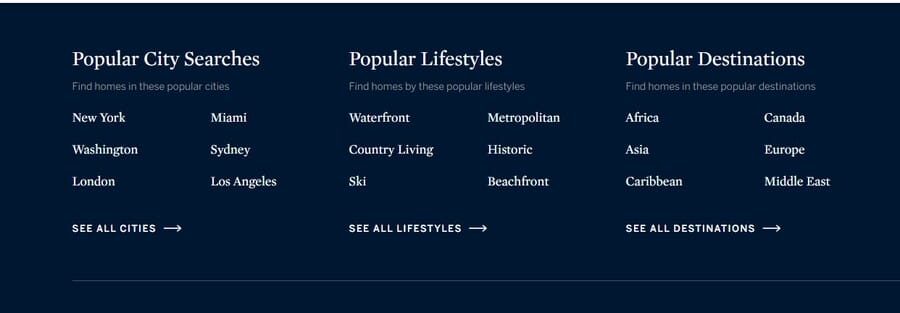
Sections like Popular City Searches and Popular Lifestyles connect users to relevant pages while helping search engines understand content relationships across the site.
This approach enhances discoverability and user navigation, reinforcing the effectiveness of internal linking in luxury real estate SEO.
Include Detailed Property Listings And Visuals
Comprehensive property pages make it easier for buyers to picture themselves in the space and trust the information provided.
Detailed content supported by high-quality visuals helps your pages rank higher while encouraging visitors to inquire.
To create listings that hold attention and drive inquiries, include the following:
- Write detailed descriptions that highlight the property’s features and appeal.
- Add neighborhood insights such as nearby schools, restaurants and transport.
- Include high-resolution photos that capture interiors, exteriors and surroundings.
- Add maps or image galleries to make exploration intuitive for visitors.
- Use structured data so search engines can accurately display your property details.
In 2024, website features played a key role in how buyers evaluated listings, with 41% of users saying photos were the most useful feature when viewing properties online.
This shows how presentation and clear structure directly influence engagement, helping your listings stand out and convert more effectively.
5. Implement Technical SEO Best Practices
Technical SEO determines how effectively your website performs in search.
With 72% of realtors now having their own websites, standing out depends on how well those sites perform and function across devices.
Applying SEO strategies for real estate websites helps improve speed, security and usability, which directly influence rankings and user engagement.
To improve your website’s performance and visibility:
- Improve site speed: Compress images, use caching and minimize code to shorten load times and reduce bounce rates.
- Enhance mobile responsiveness: Design for all devices so listings, visuals and navigation work smoothly everywhere.
- Optimize for Core Web Vitals: Track loading speed, interactivity and visual stability to meet Google’s performance benchmarks.
- Ensure site security: Implement HTTPS and use secure hosting to protect user information and build trust.
- Maintain clean, structured URLs: Keep them short, descriptive and easy for both users and search engines to interpret.
- Submit XML sitemaps: Help search engines discover and index your property pages efficiently.
- Use Google Search Console: Monitor crawl reports, resolve errors and confirm that your site is being indexed properly.
6. Improve Your Off-Page SEO
Search engines interpret external mentions, links and citations as signals of trust, which directly influence rankings and visibility.
With 66.5% of backlinks eventually breaking and 47.7% of linked pages disappearing entirely, maintaining a healthy link profile requires ongoing attention.
SEO strategies for real estate agents that prioritize quality relationships, authentic content and consistent visibility tend to create better, longer-lasting results.
To improve your off-page performance:
- Earn backlinks from reputable sources: Contribute insights to respected real estate blogs, local news outlets and industry partners that provide value to readers.
- Engage in guest posting opportunities: Share expert commentary on relevant platforms and include contextual links that point to your most valuable pages.
- Participate in verified directories: Submit your business to trusted real estate platforms such as Zillow or Realtor to build credibility and reach.
- Encourage satisfied clients to mention your brand: Reviews, testimonials and organic mentions signal reliability and help attract referral traffic.
- Monitor and maintain backlinks: Use tools like Ahrefs or Semrush to identify broken links, recover lost connections and preserve high-performing partnerships.
7. Optimize For Voice Search
Real estate searches are becoming more conversational as buyers rely on smart speakers and voice assistants to find listings, agents and local insights in real time.
80% of answers provided by Google’s voice assistant come from the top three search results, which means visibility depends on how clearly and directly your content responds to spoken questions.
Optimizing for voice involves structuring information so it’s natural to read aloud and easy for search engines to interpret.
Use the following real estate SEO strategies to make your site compatible with voice search:
- Use conversational, long-tail phrases: Reflect how people speak rather than type when searching for properties or local services, such as “Which homes are for sale near me?” or “Who’s the best real estate agent in my area?”.
- Create and update FAQ sections: Answer common questions in short, natural sentences that can be easily picked up by voice assistants.
- Include structured data: Add schema markup to help search engines understand and deliver your content in featured snippets.
- Focus on local intent: Ensure your business information, listings and service areas are accurate and consistent across platforms.
8. Ensure Accessibility And ADA Compliance
Accessibility requires ensuring that every visitor can browse listings, read descriptions and access key information with ease.
As it stands, 94.8% of home pages contain WCAG 2 accessibility issues, with low-contrast text being the most common error.
Incorporating SEO strategies for real estate investors that prioritize accessibility improves usability, aligns with compliance standards and supports better visibility in search.
You can make your website more compliant by:
- Adding descriptive alt text to all images: This helps search engines understand visual content and supports users who rely on screen readers.
- Maintaining readable color contrast: Ensure text is easy to read against background elements to accommodate users with visual impairments.
- Enabling full keyboard navigation: Allow visitors to move through menus, listings and forms without requiring a mouse.
- Using clear, descriptive link text: Replace vague phrases like “click here” with wording that explains where the link leads.
9. Create Helpful, Engaging Blog Content
83% of marketers say content marketing is the most effective method for demand generation, proving that consistent, useful information drives both awareness and qualified leads.
For real estate professionals, blog content serves as a bridge between market expertise and buyer intent, helping your agency appear when people search for insights that shape real decisions.
The goal is to publish articles that answer meaningful questions, explain trends clearly and position your brand as a knowledgeable voice in the market.
Creating content that performs and resonates requires:
- Focusing on buyer intent: Write about topics your audience is actively searching for, such as “best neighborhoods for families in Austin” or “what to know before selling your first investment property.”
- Publishing local market insights: Share updates on pricing trends, new developments and user behavior to connect with readers in your area.
- Developing neighborhood guides: Highlight local communities, amenities and property types to capture searches tied to specific areas and demonstrate expertise.
- Repurposing valuable content: Transform blog posts into short videos, infographics or newsletters to extend reach across different channels.
Take Zillow as an example. Its Learning Center serves as a comprehensive resource hub that guides buyers, sellers, and homeowners through every stage of the real estate journey.
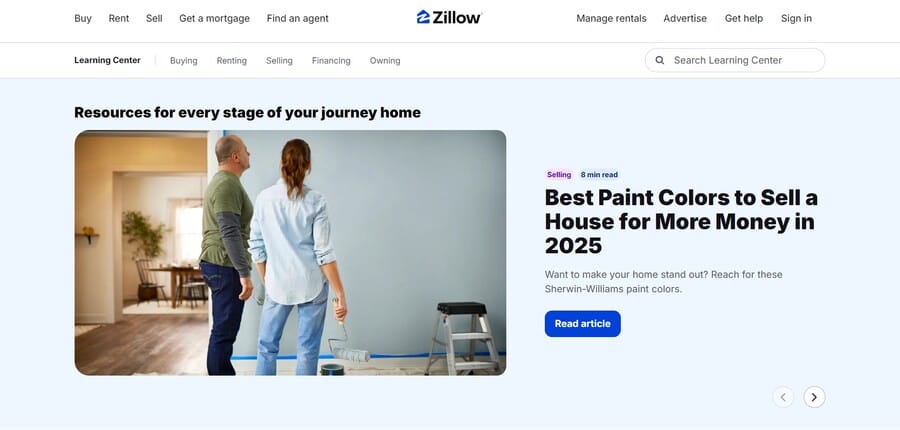
Articles are organized by topics like buying, selling and financing, each tailored to specific user pain points, such as practical how-tos to market education.
This approach transforms content into a strategic asset that builds trust, supports search visibility and positions Zillow as both an authority and a helpful companion throughout the property process.
10. Track Key Performance Indicators
With the average conversion rate for real estate being at the lower end of the spectrum, with 3.28%, it’s important to understand which efforts are generating meaningful engagement and which are falling short.
Applying SEO for real estate strategies involves tracking metrics that connect visibility to measurable business outcomes rather than surface-level activity.
The focus should be on how people find you, interact with your listings and take action once they land on your site.
To create a results-driven KPI tracking process:
- Monitor keyword performance: Identify which search terms consistently attract qualified traffic and align with your lead goals.
- Review organic traffic trends: Evaluate which pages hold attention and drive inquiries to refine your content priorities.
- Track conversion events: Use Google Analytics (GA4) to measure actions like property inquiries, form completions, and scheduled viewings.
- Assess ROI across channels: Compare organic performance with paid campaigns to guide budget decisions and future investments.
- Adjust quarterly: Review data regularly to adapt to market shifts, algorithm changes, and buyer behavior patterns.
Digital Silk’s Real Estate Example
Digital Silk partnered with RE/MAX Costa Rica to modernize their digital infrastructure and streamline how agents manage listings.
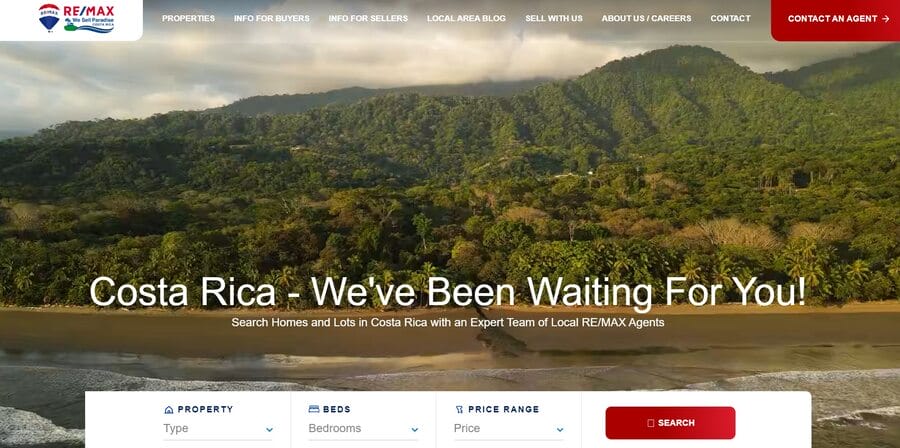
Our team designed a custom website equipped with a centralized property database, advanced search functionality and broker-specific tools that replaced outdated third-party systems.
One of the key additions, a built-in PDF exporter, allows brokers to create professional client materials instantly, which delivers efficiency, consistency and a smoother experience for both agents and buyers.
Real Estate SEO And Its Impact On Property Sales
Search visibility connects listings with active buyers, supports lead generation at scale and contributes to lasting market influence.
When integrated into broader marketing efforts, SEO becomes a consistent driver of growth rather than a short-term tactic, with benefits such as:
- Visibility in competitive markets: High-ranking listings reach buyers at the exact point of interest, improving discovery and positioning agents ahead of local competitors.
- Cost-effective lead generation: SEO produces a steady stream of qualified traffic without the ongoing expense of paid advertising, helping marketing budgets perform more efficiently.
- Long-term value creation: Each optimized page builds authority that compounds over time, allowing consistent visibility even as market conditions evolve.
- Scalability across listings: With more than 800,000 houses sold in the U.S. in August 2025 alone, even small visibility gains can translate into significant increases in exposure and lead volume.
- Sustained brand equity: Consistent rankings reinforce recognition and trust, shaping buyer perception well before they reach out to an agent.
Future Trends In Real Estate SEO
Advances in technology are reshaping how buyers search, compare and interact with listings.
The following developments highlight where SEO in real estate is heading and what professionals should prepare for:
- AI-driven personalization: 50% of realtors report that AI has had a moderately or significantly positive impact on their business, helping tailor content and recommendations to match buyer behavior.
- Augmented reality and visual search: AR tools and image-based search are changing how users explore properties, allowing them to visualize homes and neighborhoods directly within digital platforms.
- Voice search integration: As more homebuyers use voice assistants to find nearby listings or agents, optimizing for conversational queries will become increasingly valuable.
- Technology-enabled engagement: With 79% of realtors using eSignature tools to streamline transactions, buyers and sellers increasingly expect seamless digital experiences that extend from property discovery to contract signing.
- Automation in optimization: Smarter analytics and automated reporting will simplify how agencies monitor SEO performance and adjust their tactics in real time.
Develop Data-Driven Real Estate SEO Strategies With Digital Silk
Real estate growth depends on visibility that connects data, technology and human intent.
Turning insight into action is what separates consistent growth from short-lived results, as every search and interaction becomes part of a measurable system.
Digital Silk’s SEO experts craft customized strategies that use data and performance analytics to help real estate brands attract qualified leads, enhance engagement and turn visibility into lasting growth.
As a recognized digital marketing agency, our services include:
- SEO services
- Digital marketing
- PPC management
- Social media marketing
- Branding for real estate agencies
- Real estate website design
Our team manages every stage of the process to ensure transparent communication and tangible results throughout.
Contact our team, call us at (800) 206-9413 or fill in the Request a Quote form below to schedule a consultation.
"*" indicates required fields


